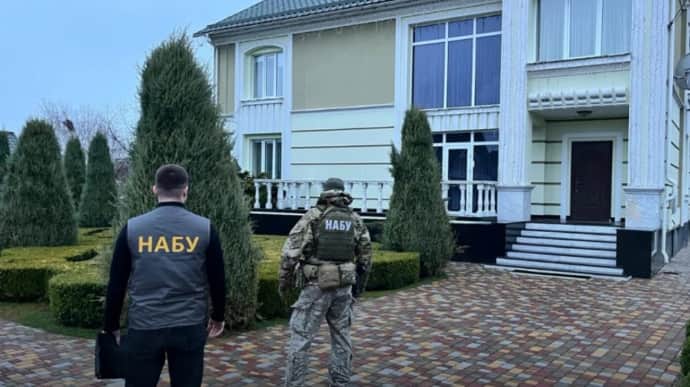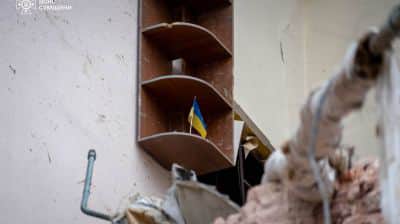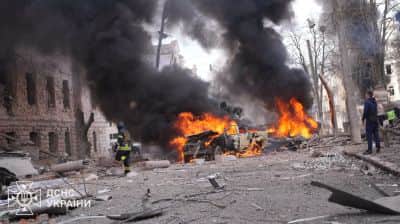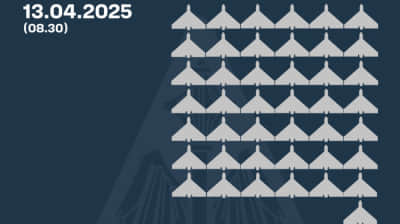Ukraine's Anti-Corruption Bureau uncovers over US$17.8m embezzlement scheme at Defence Ministry

On 2 April, Ukraine’s National Anti-Corruption Bureau (NABU) and the Specialised Anti-Corruption Prosecutor’s Office (SAPO) exposed a corruption scheme involving over UAH 733 million (approx. US$17.8 million) in embezzled funds during food procurement for the Armed Forces in 2022-2023. The scheme involved a Defence Ministry official and affiliated suppliers.
Source: NABU
Details: Charges have been brought against a former head of a department within the Ministry of Defence, the owner of affiliated supply companies, two company executives and another individual who took part in the embezzlement of state funds during food procurement for the Armed Forces amid Russia’s full-scale invasion.
Their actions are being investigated under Articles 191.5 (misappropriation, embezzlement or conversion or property by malversation), 15.2 (criminal attempt) in conjunction with 191.5, and 209.3 (legalisation (laundering) of criminally obtained money and other property) of the Criminal Code of Ukraine.
Investigators found that in 2022–2023, food supplies for the military were arranged via pre-assembled "food kits" selected from a catalogue of 409 items. However, only 10% of those products – such as vegetables, grains, meat and water – were regularly ordered. The rest, including spices, gelatine or berries, were rarely or never ordered due to their seasonal nature.
Quote from NABU: "This system allowed suppliers to manipulate prices – artificially inflating the cost of high-demand products while lowering prices for unpopular or seasonal products (such as cherries or apricots in winter). At first glance, there were no violations, as the total price of the kit remained unchanged. However, potatoes, supplied in thousands of tonnes, cost a fortune, while seasonal berries and fruits, which were rarely ordered, were priced at mere pennies."
More details: Between August and December 2022, two companies under one owner earned over US$17.8 million in excess profits using this scheme, as confirmed by expert analysis. Some of the funds were then funnelled out under the guise of dividends and financial aid to related firms. Investigators suspect the money was used to purchase hotels in Croatia and other property.
The corruption was enabled by a Defence Ministry official who allegedly ignored the anomalous prices listed in the catalogue while signing off on contracts.
Following the start of the pre-trial investigation in January 2023 – and after widespread media reports, including those about eggs allegedly costing UAH 17 (approx. US$0.41) apiece – the scheme’s participants reduced prices for the 11 most in-demand products, preventing a further US$19.2 million in budget losses.
Background:
- On 21 January 2023, ZN.ua media outlet reported that Ukraine’s Defence Ministry was purchasing food for servicemen at prices two to three times higher than Kyiv shops were charging. The December contract with the food company was signed on behalf of the ministry by Bohdan Khmelnytskyi, then head of the State Procurement Department at the Ministry of Defence of Ukraine, who was involved in a case of embezzlement of US$580,000 during the procurement of military ammunition.
- Public outrage erupted over a journalist investigation that cited the infamous "UAH 17 per egg" figure. At the time, the Defence Ministry called the story manipulative and misleading, and then Defence Minister Oleksii Reznikov denied wrongdoing. He later admitted in an interview with Ukrainska Pravda that he had reacted too emotionally and promised to verify the journalists’ findings.
- Deputy Defence Minister Viacheslav Shapovalov resigned on 24 January amid the scandal, and Khmelnytskyi was dismissed from his post as procurement department head the following day.
- Prime Minister Denys Shmyhal later ordered a reform of the procurement system for the Armed Forces, requiring price disclosures for food and goods.
- The Defence Ministry of Ukraine stated that it is collaborating with law enforcement agencies to eliminate the risks of corruption in procurement for the Armed Forces, while simultaneously implementing a new NATO-standard procurement architecture.
Support Ukrainska Pravda on Patreon!





